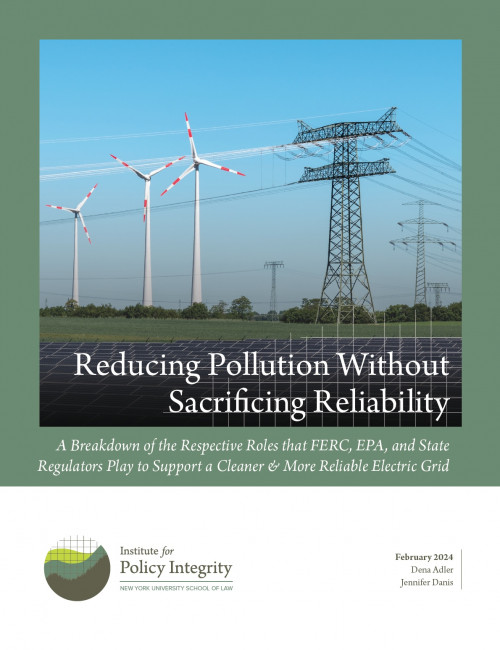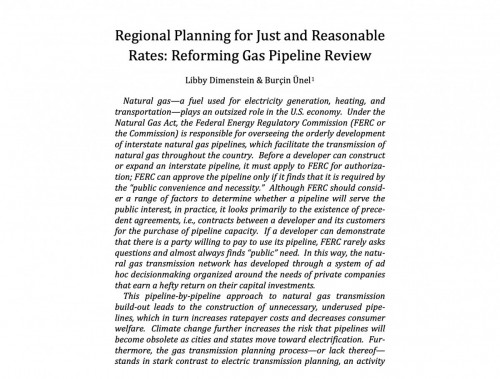-
FERC Decision Vacated in Case Where Policy Integrity Submitted a Brief
Advocates have been trying for decades to engage FERC in a significant course correction: assessing whether interstate gas pipelines serve the public interest, rather than relying on private contracts to assume that it does. Yet FERC has resolutely ignored its Natural Gas Act mandate to protect the public interest, including when it approved the Regional Energy Access pipeline despite substantial evidence showing the project would serve private interests at the public’s expense. In a case where Policy Integrity submitted an amicus brief demonstrating why FERC’s decision ought not receive deference, the D.C. Circuit vacated FERC’s authorization. This was the first time that the courts have done so for a project where there wasn’t blatant affiliate self-dealing.
-
Policy Integrity Comments Reflected in FERC’s Order 1920 on Transmission Planning and Cost Allocation
On May 13, 2024, FERC issued Order 1920, a landmark rule to improve regional transmission planning and cost allocation processes. The Order could ease the process of expanding electric transmission, helping integrate much more renewable energy to the U.S. grid. We submitted four rounds of comments in this proceeding: at the advanced notice of proposed rulemaking stage, then on the proposal, and then two sets of supplemental comments. For several key features of the final rule, FERC adopted our recommendations.
-

Reducing Pollution Without Sacrificing Reliability
A Breakdown of the Respective Roles that FERC, EPA, and State Regulators Play to Support a Cleaner & More Reliable Electric Grid
Multiple federal and state regulators must coordinate their efforts to ensure electric grid reliability, particularly during a period of major transition, and it is important to understand what role each of them plays. This report reviews the respective roles of FERC, RTOs/ISOs, other transmission operators, state public utility commissions, and state environmental regulators. EPA’s duty to reduce GHG emissions that endanger public health and FERC’s duty to steward grid reliability will require them to coordinate each other’s respective expertise as they work with RTOs/ISOs, state regulators, and utilities to implement EPA rules.
-

Regional Planning for Just and Reasonable Rates: Reforming Gas Pipeline Review
Published in the Columbia Journal of Environmental Law
Natural gas plays an outsized role in the U.S. economy. Under the Natural Gas Act, the Federal Energy Regulatory Commission (FERC or the Commission) is responsible for overseeing the orderly development of interstate natural gas pipelines, which facilitate the transmission of natural gas throughout the country. FERC can approve the pipeline only if it finds that it is required by the “public convenience and necessity.” Although FERC should consider a range of factors to determine whether a pipeline will serve the public interest, in practice, it looks primarily to the contracts between a developer and its customers for the purchase of pipeline capacity. If a developer can demonstrate that there is a party willing to pay to use its pipeline, FERC rarely asks questions and almost always finds “public” need. This pipeline-by-pipeline approach to natural gas transmission build-out leads to the construction of unnecessary, underused pipelines, which in turn increases ratepayer costs and decreases consumer welfare. Climate change further increases the risk that pipelines will become obsolete as cities and states move toward electrification. Relying on economic theory, legal history, and policy analysis, we make the case in this paper—pulished in the Columbia Journal of Environmental Law— for FERC’s adoption of regional gas transmission planning.
-
Supplemental Comments to EPA on Reliability & the Proposed GHG Regulations for Fossil Fuel-Fired Power Plants
In May 2023, the Environmental Protection Agency (EPA) proposed a package of regulations to limit greenhouse gas emissions from fossil fuel-fired power plants under Section 111 of the Clean Air Act. EPA subsequently issued a supplemental notice of proposed rulemaking, re-opening its comment period and soliciting comment on whether to include additional mechanisms to address potential reliability issues. In these comments, we explain why EPA has engaged in reasoned rulemaking and developed a robust administrative record comporting with its mandate to reduce power sector pollution. It remains the Federal Energy Regulatory Commission’s (FERC’s) responsibility to ensure reliable bulk-power system (BPS) operations and to use its corresponding tools to address the wider reliability challenges of the clean energy transition, in coordination with other reliability-related entities.
-
Comments to FERC in Support of Technical Conference on Capacity Accreditation
Policy Integrity submitted comments to FERC in support of American Clean Power Association’s petition for a technical conference on capacity accreditation. Holding a technical conference would be appropriate because accurate accreditation is becoming increasingly difficult as grids accommodate rapidly changing resource mixes with varying energy and reliability attributes, public policy constraints, and increasing/unprecedented extreme weather events. Moreover, accreditation has become more consequential, as capacity market revenues have grown to a significant share of total market payments. We included several questions that would merit discussion at the technical conference.
-
Amicus Brief in D.C. Circuit Opposing FERC Pipeline Approval
The Federal Energy Regulatory Commission (FERC) recently approved the construction of a new natural gas pipeline that would run through New Jersey and Pennsylvania. The gas capacity this expensive pipeline would provide, most of which will serve New Jersey markets, is unnecessary to meet the demand of New Jersey customers: the New Jersey Board of Public Utilities commissioned a study that demonstrates as much. We submitted an amicus brief in support of petitioners challenging this pipeline. In our brief, we explain that, in approving pipeline applications, FERC has abdicated its statutory responsibility to examine whether a pipeline is truly needed. Instead of determining whether a pipeline would serve the public interest, FERC defers to the assertions of profit-motivated pipeline developers and their customers. FERC's practice of approving needless pipelines is particularly concerning in light of how it regulates the development of electric transmission infrastructure, a related regulatory process. We argue that FERC should have placed greater weight on the rigorous economic study conducted by an expert state agency charged with ensuring safe and adequate gas supply for its residents.
-
FERC Environmental Justice Roundtable Comments
The Federal Energy Regulatory Commission (FERC), the agency responsible for regulating interstate energy infrastructure and markets, is seeking to better incorporate environmental justice into its decision-making. On March 29th, 2023, FERC held its first-ever Environmental Justice Roundtable where Policy Integrity’s Environmental Justice Director, Al Huang, testified and provided suggestions on how the Commission can identify, avoid, and minimize adverse impacts on environmental justice communities. We submitted additional comments to FERC on these issues, as well as on FERC's legal authority to incorporate environmental justice into its permitting decisions.
-
Comments to FERC on its Backstop Siting Authority
Following the passage of the Bipartisan Infrastructure Law, the Federal Energy Regulatory Commission (FERC) proposed implementing regulations for its authority to site transmission projects that have been rejected or not acted upon by states. We filed comments advising FERC that, to make these determinations and satisfy FERC's obligations under the National Environmental Policy Act, the Commission must consider how proposed transmission projects would affect emissions from power plants. Our comments further recommend improvements to the proposed rule's environmental justice provisions, which also relate to FERC's obligation to ensure that proposed projects are consistent with the public interest.
-
Policy Brief and Supplemental Comments on the FERC Transmission Planning Rule and the Major Questions Doctrine
Together with Harvard’s Electricity Law Initiative, we prepared a policy brief and supplemental comments defending the Federal Energy Regulatory Commission’s (FERC) proposed rule on transmission planning reform from arguments that the proposal would trigger the major questions doctrine. We review previous transmission planning regulations and orders by FERC to explain that the major questions doctrine does not apply because the proposed rule is neither unheralded nor transformative.
Viewing recent projects in FERC










